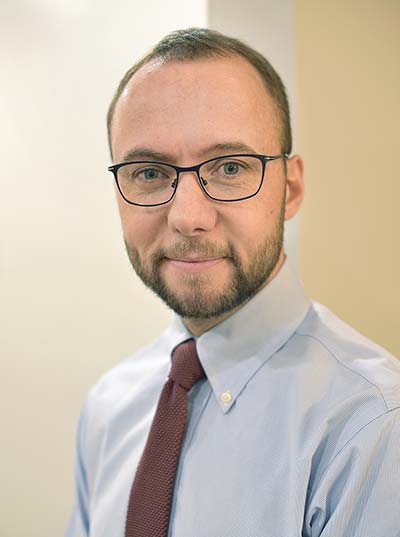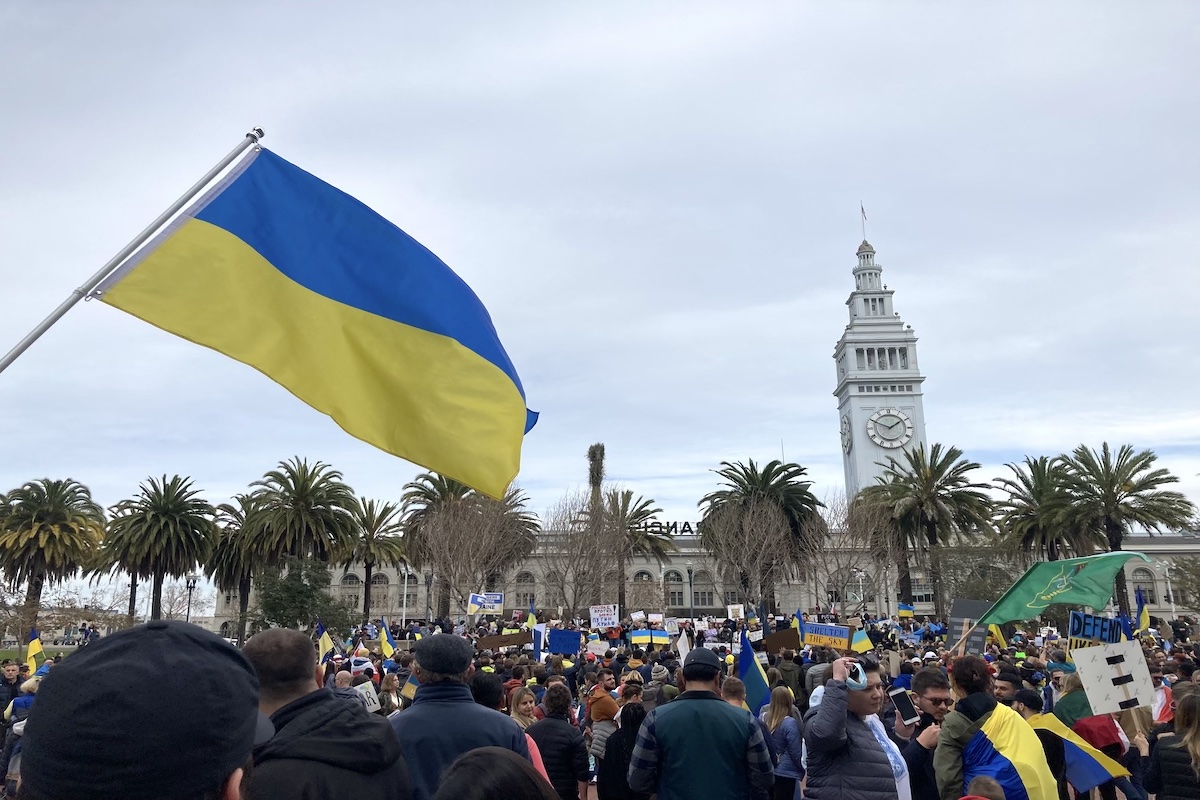February 24 marked the one-year anniversary of Russia’s invasion of Ukraine, sparking the largest conflict in Europe since WWII while hardening geopolitical rifts between the world’s leading powers. The war has since claimed tens of thousands of lives on both sides and currently shows little sign of ending. Andrew Nynka is editor of the Ukrainian Weekly and Svoboda, the world’s oldest Ukrainian language newspaper based in New Jersey. EMS spoke with Nynka shortly after Russia’s initial invasion to hear from him how the Ukrainian community in the US was responding to the conflict. We reached out to him again to see what, if anything has changed, and to get his perspective on the road ahead for Ukraine. (Above: Hundreds gathered for a rally in San Francisco to protest Russia’s invasion of Ukraine. Credit: Peter Schurmann.)
What is your assessment of the war on this anniversary?
Two things: Ukrainians around the world are so proud of how brave and strong the Ukrainian military is at holding off the Russian invasion and shocked at how bad the Russian army is. The West thought the invasion would be over in a matter of weeks, max. So initially the US, Germany, UK, and France had actually prepared to negotiate a new political landscape with Russia. But suddenly, the Ukrainian army has proven that as long as the West can continue to supply modern weapons, the Ukrainian people can win the war and regain their sovereignty. As a result, the West and Ukraine are now preparing a different geopolitical landscape in Europe and with Russia.

What’s the Ukrainian American community’s impression of President Zelensky’s performance?
In any political arena, it’s not possible to receive 100% endorsement. Likewise, the Ukrainian American community had mixed views when Volodymyr Zelensky first got elected president. When President Zelensky rejected the offer to flee the country (at the outset of the war) and was instead seen everywhere in Ukraine with the strong and clear message to all Ukrainians – and the world – that “I’m here, the government is here, we’re not leaving, we’re staying to fight,” he won the hearts of all Ukrainians around the world, including America. And his determination has become critical in this war in unifying people and maintaining high morale in Ukraine.
What has been the involvement of the Ukrainian American community in this struggle?
Since the beginning, many of us have gone to Ukraine to help displaced people, join the fighting, and fill any gaps. Back here in the US, our collective communities across the country have been working nonstop to fundraise and send donations to Ukraine. To be honest, we’ve also developed fatigue, we’ve become emotionally and physically exhausted. But at the same time, the high morale and winning battles in Ukraine inspire us to keep going.
Has this war redefined the Ukrainian identity on the world stage?
Many of us may be speaking Russian and the country at times came under the influence of the old Russian empire or wrapped within the Soviet Union, but our national identity has always been there. From this war, it’s really the world that suddenly sees… ordinary farmers, workers, housewives, tailors, and bureaucrats came together under the Ukrainian flag and beat back Russian troops, who are thugs whose behavior has violated all human rights. Within the global community, we’re now clearly identified with Western Europe.
How do you see the war’s possible end? Can there be peace?
I, along with many experts, believe the war should end within 2023. As the Russian army is gradually breaking apart, Ukrainian troops are advancing with fresh supplies of modern weapons from the West. Eventually, Putin will be forced to negotiate a peace treaty. But we all know that such a treaty is just a temporary measure. Ukraine will be on constant alert with a standby army as long as Putin is still in power. Many say Putin’s failed invasion will also spell his political demise. If that happens, and the autocratic system he leads also gets replaced with a real, structural democracy, then I think peace and stability in the region are possible.
What does a post-war Ukraine look like?
This war has brought so much pain and suffering to the Ukrainian people. But out of this tragedy, I do see a potentially brighter future. Socially, corruption was a serious issue in Ukraine before the invasion. President Zelensky has recently taken steps to deal with it even in the midst of the war by removing many corrupt officials, including some who were his friends, high ranking officials in his administration. So this is a very strong signal to the Ukrainian people and to the West that corruption will not be tolerated.
Militarily, before the war, the Ukrainian army was basically using old Russian weapons, equipment, and technology. Now they are getting training to use modern battle tanks like German Leopard and American M1, not to mention the sophisticated drones, missiles, and possibly fighter jets in the near future. The coming of this war has meant that Ukraine will have a truly modernized military.
Economically, given so much destruction throughout the country, the rebuilding will be massive. There have been many conferences with government agencies, NGOs, and private companies about reconstruction plans. All point to building new infrastructure, modernized transportation, better buildings and houses. I’m optimistic that many Ukrainians will also come back to take part in the building of a new nation.




